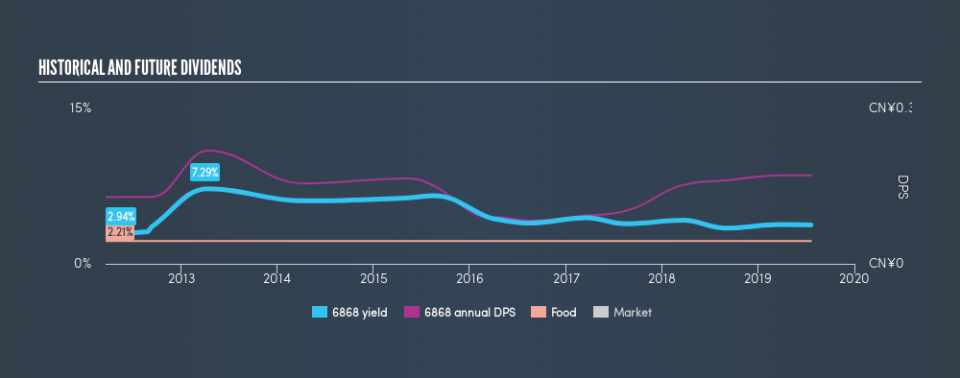Is Tenfu (Cayman) Holdings Company Limited (HKG:6868) A Great Dividend Stock?

Want to participate in a short research study? Help shape the future of investing tools and you could win a $250 gift card!
Dividend paying stocks like Tenfu (Cayman) Holdings Company Limited (HKG:6868) tend to be popular with investors, and for good reason - some research suggests a significant amount of all stock market returns come from reinvested dividends. Unfortunately, it's common for investors to be enticed in by the seemingly attractive yield, and lose money when the company has to cut its dividend payments.
With a goodly-sized dividend yield despite a relatively short payment history, investors might be wondering if Tenfu (Cayman) Holdings is a new dividend aristocrat in the making. We'd agree the yield does look enticing. The company also bought back stock during the year, equivalent to approximately 2.5% of the company's market capitalisation at the time. Some simple research can reduce the risk of buying Tenfu (Cayman) Holdings for its dividend - read on to learn more.
Explore this interactive chart for our latest analysis on Tenfu (Cayman) Holdings!
Payout ratios
Dividends are usually paid out of company earnings. If a company is paying more than it earns, then the dividend might become unsustainable - hardly an ideal situation. So we need to form a view on if a company's dividend is sustainable, relative to its net profit after tax. Looking at the data, we can see that 78% of Tenfu (Cayman) Holdings's profits were paid out as dividends in the last 12 months. Paying out a majority of its earnings limits the amount that can be reinvested in the business. This may indicate a commitment to paying a dividend, or a dearth of investment opportunities.
Another important check we do is to see if the free cash flow generated is sufficient to pay the dividend. The company paid out 89% of its free cash flow as dividends last year, which is adequate, but reduces the wriggle room in the event of a downturn. It's encouraging to see that the dividend is covered by both profit and cash flow. This generally suggests the dividend is sustainable, as long as earnings don't drop precipitously.
Consider getting our latest analysis on Tenfu (Cayman) Holdings's financial position here.
Dividend Volatility
From the perspective of an income investor who wants to earn dividends for many years, there is not much point buying a stock if its dividend is regularly cut or is not reliable. Looking at the data, we can see that Tenfu (Cayman) Holdings has been paying a dividend for the past seven years. It's good to see that Tenfu (Cayman) Holdings has been paying a dividend for a number of years. However, the dividend has been cut at least once in the past, and we're concerned that what has been cut once, could be cut again. During the past seven-year period, the first annual payment was CN¥0.13 in 2012, compared to CN¥0.17 last year. This works out to be a compound annual growth rate (CAGR) of approximately 4.1% a year over that time. The dividends haven't grown at precisely 4.1% every year, but this is a useful way to average out the historical rate of growth.
Modest growth in the dividend is good to see, but we think this is offset by historical cuts to the payments. It is hard to live on a dividend income if the company's earnings are not consistent.
Dividend Growth Potential
With a relatively unstable dividend, it's even more important to evaluate if earnings per share (EPS) are growing - it's not worth taking the risk on a dividend getting cut, unless you might be rewarded with larger dividends in future. Tenfu (Cayman) Holdings's earnings per share have been essentially flat over the past five years. Over the long term, steady earnings per share is a risk as the value of the dividends can be reduced by inflation. Tenfu (Cayman) Holdings's earnings per share have barely grown, which is not ideal - perhaps this is why the company pays out the majority of its earnings to shareholders. That's fine as far as it goes, but we're less enthusiastic as this often signals that the dividend is likely to grow slower in the future.
Conclusion
When we look at a dividend stock, we need to form a judgement on whether the dividend will grow, if the company is able to maintain it in a wide range of economic circumstances, and if the dividend payout is sustainable. First, we think Tenfu (Cayman) Holdings is paying out an acceptable percentage of its cashflow and profit. Unfortunately, earnings growth has also been mediocre, and the company has cut its dividend at least once in the past. In sum, we find it hard to get excited about Tenfu (Cayman) Holdings from a dividend perspective. It's not that we think it's a bad business; just that there are other companies that perform better on these criteria.
Now, if you want to look closer, it would be worth checking out our free research on Tenfu (Cayman) Holdings management tenure, salary, and performance.
We have also put together a list of global stocks with a market capitalisation above $1bn and yielding more 3%.
We aim to bring you long-term focused research analysis driven by fundamental data. Note that our analysis may not factor in the latest price-sensitive company announcements or qualitative material.
If you spot an error that warrants correction, please contact the editor at editorial-team@simplywallst.com. This article by Simply Wall St is general in nature. It does not constitute a recommendation to buy or sell any stock, and does not take account of your objectives, or your financial situation. Simply Wall St has no position in the stocks mentioned. Thank you for reading.


